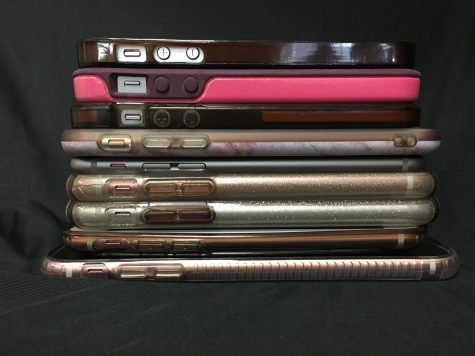Photo by Michele Sullivan
Just a few screens that have become part of everyday life.
Screenagers Part III: From the Inside Out
Part III of the Series: Is technology really as harmful as it is portrayed?
Before you continue, please understand that Screenagers, a modern film based on teens and technology, is a work that involves deep ties with psychology and analytical source material that requires breakdown and study to enjoy the film to its fullest. With that being said, feel free to check the Red and Black’s website-or the links below- for our previous articles on the film to have a better understanding of the context of this article.
Fact or fiction: technology is as addictive and harmful as Screenagers makes it out to be. The answer- it all comes down to you. By now, I’m sure either the trailer for the film or my articles have frightened you into thinking that you have become addicted to your phones and consequently have turned your brain into a shell of its former self. The truth is, like any other film, Screenagers had a bias, and my job was to analyze it and take it for what it was; now, in order to get an unbiased opinion, I met up and spoke with a well respected doctor in psychology, Dr. Norman Shulder, to get the truth for you to formulate your own opinions. The following is the conversation that he and I shared:
Michael Alduino: “First off, thank you for giving The Red and Black this opportunity and we appreciate your time. The real question everyone wants an answer to is do you believe that someone can become addicted to technology?”
Norman Shulder: “Absolutely: as of recent years I’ve seen studies of people who have become so addicted to this- “cyber world” you can call it, that they don’t know reality from a computer screen. There is no doubt in my mind that technology is as addictive as any other drugs out there.”
M.A: “A follow up to that: does technology have a negative effect on the adolescent’s mind?”
N.S: “This one’s a little more tricky because the answer is not by nature: the effect of technology depends on the user. I mean- just with anything, it all depends on who that person is and where their priorities are set. Someone such as yourself, for example, they would use their computer late at night to help finish a report or to help them study, which is positive; someone else though would use it to watch illicit things or stay up all night blowing off school work, which is a negative. Don’t let the news fool you; it’s all about the individual.”
“I’ve seen studies of people who have become so addicted to this- “cyber world” you can call it, that they don’t know reality from a computer screen. There is no doubt in my mind that technology is as addictive as any other drugs out there.”
— Dr. Norman Shulder
M.A: “Extremely insightful. Something I want to know is can technology bring about psychological disorders or is that just a myth?”
N.S: “That’s an incredibly good question because it’s a topic that is very new in psychology. Based on the DSM-5, the official encyclopedia that has every psychological disorder known to man in it, says that technology does not correlate to new disorders in anyone of any age. However, the evidence does prove that people with pre-existing psychological disorders can have them worsened, or even individuals with no pre-existing disorders can actually be triggered by technology. That is something along the lines of the Columbine shootings or someone with ADHD having their symptoms worsened. Personally, I think in the next forty years or so we will see these developments researched.”
M.A: “So to me, it seems to be an issue of extreme uses of technology, do you have recommendations for people who want to use technology but balance it in a more healthy manner?”
N.S: “The first step is realization: you have to identify the problem and then come to grips with it. From there, I think setting a finite amount of hours to use technology and determining when you don’t necessarily need it would be optimal; by making yourself prioritize when you need technology, you start to become more responsible as well.”
M.A: “Now my final question: do you believe that there is a way to promote safer use of technology or is it too late?”
N.S: “In this industry, you learn nothing is ever too late: if you lose hope then people like me and eventually you as a psychiatrist would cease to exist. The only way I feel to promote it at this time is further research and studies to have more statistics before campaigns are made against it [technology].”
M.A: Thank you for taking the time and answering these questions; on behalf of the Red and Black we are grateful for you being incredibly in-depth and well articulated with these replies. With that, have a good day.”
N.S: No problem, thank you for having such an interest in this topic and I hope this helps your paper subsequently.”
What it all comes down to is that you control your destiny- not technology. While Screenagers was very well researched and executed, the film was a microcosm that encapsulated what someone who has no self-control or limits would do in the same shoes as you. Moreover, while the movie was willing to give you the truth, it failed to consider the other side of it too, which is what I’m hoping this interview will rectify for all of you. In the end, what I’m hoping for is that you were able to see both the pros and cons of technology and were able to learn something that could potentially help you in your day-to-day life. With that, remember: technology can be your best friend- or your own worst enemy.


